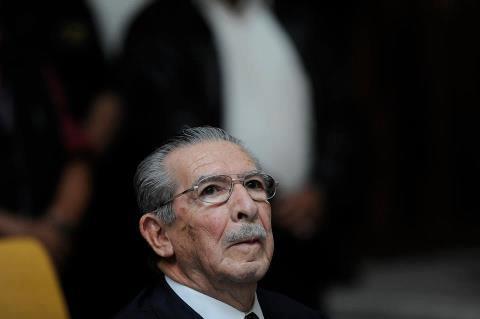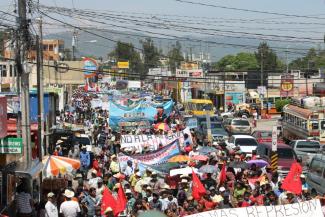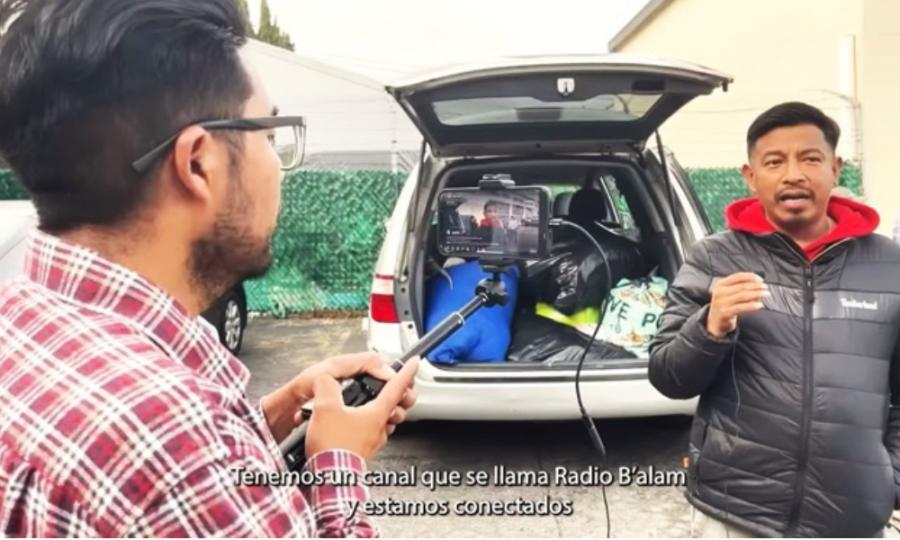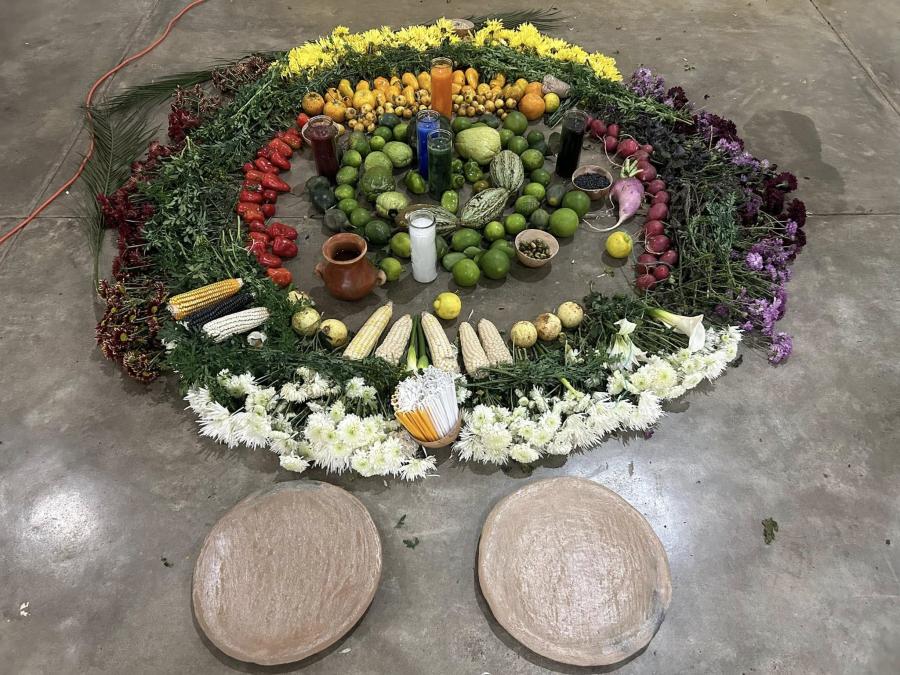
Haz clic aquí para la versión en español
On May 10, 2013, Guatemalan ex-dictator Jose Efraín Rios Montt was sentenced to 80 years in prison for genocide and crimes against humanity in an historic case. With this incredible achievement, it may appear as though the state of human rights in Guatemala is drastically improving. However, human rights violations, violence and oppression at the hands of the government remain the lived reality of Indigenous communities around the country at this time. Under the administration of the current president and ex-general in the war, Otto Perez Molina, there has been a resurgence of violence against Indigenous communities, especially those who are defending their lands against exploitation by international mining and dam companies. Read this letter to the US Secretary of State, John Kerry from the Indian Law Resource Center, explaining the current situation in Guatemala and asking for the application of international pressure against the deplorable human rights violations that are repeatedly committed against Indigenous populations by the Guatemalan government:
INDIAN LAW RESOURCE CENTER
CENTRO DE RECURSOS JURÍDICOS PARA LOS PUEBLOS INDÍGENAS
MAIN OFFICE
602 North Ewing Street, Helena, Montana 59601
(406) 449-2006 | mt@indianlaw.org
The Honorable John Kerry
Secretary of State
Department of State
Washington, D.C. 20520
Dear Secretary Kerry:
My name is Armstrong Wiggins and I am the Washington, D.C. Office Director of the Indian Law Resource Center. As a Miskito Indian leader I congratulate you on your recent appointment as Secretary of State. I also express my personal gratitude for your important and powerful role in my own life as a human rights advocate for my people, the Miskito Indians of Nicaragua, during the Reagan Administration in the 1980s. During that time you, Senator Kennedy, Senator Bradley, Senator McCain, Senator Dole, Senator Kassebaum, Senator Harkin, and many others demonstrated bipartisan support of our human rights as indigenous peoples. Your support during a time of extreme conflict was instrumental for us.
I come to you again because of the increasingly grave human rights situation for the Maya, Xinka, and Garifuna people in Guatemala and ask that you help us with this important issue. After first reviewing the alarming human rights situation in Guatemala, I want to offer a few recommendations that I believe would improve the situation.
The Maya people are the majority population in Guatemala, consisting of 22 different indigenous nations; yet the political and social landscape of the country is governed by a minority, a de facto apartheid in our own Hemisphere. This lack of political representation and participation has led to grave human rights violations due to conflicts over natural resources, most of which are in indigenous peoples’ lands and territories. We urgently need the United States to demonstrate once again that it is an international human rights leader and to make clear, through bipartisan action, that it will not tolerate any state’s continued human rights violations. These violations are not only affecting whole communities, but they are threats to regional stability, democracy, and the rule of law. As you yourself once said: “Values are not just words, values are what we live by. They're about the causes that we champion and the people we fight for.”
President Obama will be attending the Central American Integration System (SICA) summit next week. As a Regional Observer, the United States can call attention to the serious human rights violations facing indigenous peoples in Guatemala and throughout the region. Members of SICA must be reminded that in order to realize their objective of integration and transforming Central America into a region of “peace, democracy and development” they must abide by their own commitment to respect and promote human rights, in order to ensure positive development outcomes and sustainability.
In the 1980s, under the dictatorship of army General José Efraín Rios Montt, Guatemala experienced some of the most violent times of its four-decades-long internal armed conflict. Today, even as Rios Montt’s trial for genocide was annulled on a technicality, the country is once again reverting back to violence and repression. We are deeply concerned that the political situation in Guatemala has become increasingly tense and fragile under the administration of President Otto Perez Molina. We are alarmed by the increased militarization in response to this social and political instability. Just as one example, in October 2012 the Totonicapán Massacre occurred because military forces and not the police were deployed to confront protesters in Q'iche territory. Indigenous peoples had gathered to protest constitutional reforms, reforms to the education certification process, and tax hikes on electricity. The result of this clash between protesters and soldiers was the killing of eight indigenous Maya Q’iche people and more than 30 wounded. President Molina's command of troops in the 1980s during an especially violent period of the internal armed conflict coupled with his promise to combat crime with an “iron fist” raises serious concerns about his administration’s direction.
Human rights defenders, mostly indigenous, who are raising concerns about development projects and unjust legislative reforms, are being killed, criminalized, and constantly threatened. Since January of this year alone, five prominent leaders have been killed: Tomas Kej, Q’eqchi’; Carlos Antonio Hernandez, Geronimo Sol Ajcot, Tzutujil; Exaltación Marcos Ucelo, Xinka; and Daniel Pedro Mateo, Q´anjob´al. Three others have received threats, four were kidnapped (resulting in the death of Mr. Ucelo), Ruben Herrera of Huehuetenango has been wrongfully jailed, and 26 were illegally detained and later released, after peaceful protests. Evictions have also occurred with linkages to oil and mining concessions and palm oil plantations, on one hand, and protected areas, on the other. One such violent eviction occurred last February affecting Q’eqchi’ families in Monte Verde Livingston, resulting in the destruction of their homes and the imprisonment of four community leaders. As of early April 2013, there has been a reported approval of 22 evictions for the area of Livingston alone, potentially impacting both Q’eqchi’ and Garifuna peoples. Communities across Guatemala such as San Rafael Las Flores, Santa Rosa; Santa Cruz Barillas, Huehuetenango; Nebaj, Quiche; Santa Maria Xelapan, Jutiapa; El Estor, Izabal; San Miguel Ixtahuacan, San Marcos; San Juan Sacatepéquez, Guatemala; Livingston, Izabal and others have requested that the State comply with its domestic and international human rights obligations as it relates to their rights to land, territory, a clean environment, and natural resources.
It is precisely indigenous peoples’ rights of self-determination over their lands, territories, environment, and natural resources that have had little protection under Guatemala’s current legal framework. Consequently, this has led to extreme insecurity and vulnerability for indigenous peoples and their rights. The lack of recognition and protection of indigenous peoples’ collective rights to land is a fundamental component of conflicts stemming from the expansion of natural resource extraction and development projects. This inadequate legal recognition and protection of lands has led the Ministry of Energy and Mines (MEM) to grant 276 exploitation licenses, 111 exploration licenses, 734 pending licenses, and most recently to grant 7 exploration licenses without consulting the affected indigenous peoples. The majority of the slated projects are in indigenous peoples’ territories. On April 3, MEM announced that it had granted two more exploitation licenses, one for the Escobal San Rafael Mine (owned by Canadian Tahoe Resources) in the department of Santa Rosa and the other for Niquegua Montifur Mine in Los Amates, Izabal (owned by Compañia Guatemalteca de Niquel, a subsidiary of Solway Investment Group Limited Inc.). This announcement has resulted in further violence and criminalization of indigenous and other leaders. MEM also indicated that energy needs for all these slated projects will result in the creation of 53 hydroelectric substations to support the energy grid.
Mr. Secretary, contrary to government propaganda, indigenous peoples are not against development. Indigenous peoples are opposed to the continued disregard of their selfdetermination in decision making processes over their lands, territories and natural resources. Even though much of the remaining natural resources are on their lands, they are not consulted on processes specific to development projects in their lands and territories, not considered rights holders or development partners. As evidenced by the Marlin Mine in San Miguel Ixtahuacan, environmental damage caused by Goldcorp and the State are occurring with little oversight and protection. Indigenous leaders often find their territories subject to concessions—including those for oil, mines, hydroelectric and industrial agriculture—once the government has already issued the respective permits. Indigenous peoples have necessarily denounced Guatemala as a racist and discriminatory state, which lacks a comprehensive legal and policy framework that respects and upholds their particular needs and rights.
The mounting pressure of development projects, coupled with a lack of political decision making power and representation, has forced indigenous peoples to utilize both political and legal recourse to voice their opposition to these unsustainable development projects. Since 2005, indigenous peoples have conducted 72 Consultas Comunitarias de Buena Fe (Good-Faith Community Consultations), 2 were conducted by multi-ethnic communities. These 74 Consultations show unanimous opposition to unsustainable exploitation of natural resources that does not respect indigenous peoples’ right to land and that causes harm to the environment in which they live. These consultations are based on ancestral decision-making processes and have been organized by both traditional indigenous authorities and indigenous institutions created and led by the Maya people. Because of the work by prominent human rights defenders within these processes, they have been disproportionately targeted for their vocal opposition and leadership. In March 2012, El Consejo de Pueblos Maya del Occidente – CPO (Council of Indigenous Peoples from the Western Highlands) brought forth a constitutional challenge in the courts against the Mining Law. This challenge was based on the lack of recognition of consultation rights—rights recognized within the ILO Convention 169. In another case, the Maya Q'eqchi' Agua Caliente Lot 9 Community in El Estor, Izabal worked for the recognition of its collective rights to land, and the Constitutional Court of Guatemala ruled in favor of the community. Despite this historic decision, Guatemala has yet to implement the ruling and the community continues to live in fear of forced evictions to make way for mining exploration and exploitation. Both the political and legal responses by indigenous peoples and by the courts to accelerated development projects that violate international human rights standards have received little acknowledgement from the state.
As I mentioned earlier, the increased military presence—including the installation of a military detachment in Quiche, and two brigades in Peten, and San Juan Sacatepéquez in 2012—have caused fear among the population. In 2012, President Molina declared a state of emergency in Santa Cruz Barillas, Huehuetenango during a conflict resulting in the killing of a leader and the wounding of two others due to opposition to the Hydroelectric Santa Cruz. This trend has made indigenous peoples fearful for their safety and re-traumatized communities. Remilitarization and implementation of megaprojects is a continuation of the same sorts of acts that were characteristic of the period of internal armed conflict, raising again issues that were never resolved and left many indigenous peoples dead.
Mr. Secretary, we are encouraged by your recent statement in which you underscored the importance of U.S. leadership to “ensure security and stability around the globe, advance human rights, foster democracy, promote equality,” all essential elements of the Administration’s policies in the Western Hemisphere. In bilateral relations with Guatemala, the Government must respect and promote the particular human rights of the Maya people, if real democracy, inclusive development and rule of law are to prevail. As you move forward with your FY2014 budget request, we provide some concrete recommendations for consideration for relations between the United States and Guatemala.
Encouraging respect for human rights and the rule of law. There must be continued support of the International Commission against Impunity (CICIG), a commission that has prosecuted war criminals, organized crime, drug traffickers, and worked hard to ensure respect for the rule of law in Guatemala. Specifically we ask that you:
• Continue financial support to the CICIG as requested in the FY2014.
• Request that all recent cases of killings and kidnappings of human rights defenders are promptly investigated by the CICIG in order to bring the perpetrators of these crimes to justice.
• Provide support to the CICIG’s strategic plan, including both technical and operational support for investigation, training and skill building of the Public Prosecutor’s Office, the National Police, and the judiciary.
• Make clear to the Guatemala government that they need to protect all witnesses and victims bringing cases forward. This is particularly critical in the effort to end impunity.
• Continue to make clear that corruption will not be tolerated, because it is an obstacle to the full and effective functioning of the CICIG.
• Ensure that the State Department’s annual Country Report on Human Rights Practices for Guatemala pays particular attention to any violations of indigenous peoples’ rights.
Supporting the institutionalization of democracy and implementation of the peace accords. It is imperative that the United States support the development of democracy and the rule of law through the implementation of the Peace Accords. In particular, the rights of indigenous peoples, the majority of the population in Guatemala, must be respected and upheld by a racial and ethnic minority who continue to control state power. In particular we recommend that there be:
• Support of the Agreement on identity and rights of indigenous peoples. It has had little advancement thus far. Indigenous peoples in Guatemala continue to be discriminated against, resulting in under representation in political, social, cultural, and economic initiatives,
policies, and laws. At the national level, the lack of adequate or reasonably proportionate political representation continues to be the norm, with only 22 indigenous members in a 158- member Congress. This lack of participation has resulted in continued discriminatory laws and practices against the 22 Maya nations, nations that constitute more than half of the population.
• Encourage the participation of indigenous women in national politics not only to address the multiple levels of discrimination faced by indigenous women, but to ensure their meaningful contribution to nation building and democracy.
• Work with the government of Guatemala to move away from using the military to respond to social and political unrest, particularly because the Peace Accords call for the military to be used against external threats, and because the most recent use of the military in specific conflicts around development projects have resulted in violence and killings.
• Encourage and support the State to create a process for the peaceful resolution of disputes with indigenous peoples, a process which respects indigenous peoples’ rights of self-determination and self-government and promotes the full and effective implementation of the United Nations Declaration on the Rights of Indigenous Peoples. The Declaration was supported by both the United States and Guatemala.
• Strong and direct engagement by the United States Embassy in Guatemala with Maya nations and their representative traditional institutions and governments.
• Greater attention to human rights violations affecting indigenous peoples and public denunciations when such violations take place. (To date, the US Embassy has not made any public statement regarding the violations detailed in this letter.)
Supporting broad-based economic growth and sustainable development and maintaining mutually beneficial trade and commercial relations. At no time should business be conducted at the expense of human rights. Just as the United States is committed to the economic health of its country, it should work to ensure that Guatemala does the same. The State Department reported in its Guatemala 2012 Human Rights report that many of the attacks against human rights defenders were “related to conflicts over land and the exploitation of natural resources.” We believe that the solution to mitigating this conflict is to adopt a human-rights framework for development that promotes and ensures:
• Respect for indigenous peoples’ self-determination and self-government, including their rights to their ancestral lands, territories, and natural resources.
• That companies abide by Guatemala’s domestic and international human rights obligations, including those found within the ILO Convention 169 and the United Nations Declaration on the Rights of Indigenous Peoples.
• That multilateral development banks such as the Inter-American Development Bank, International Bank for Reconstruction and Development (World Bank), and others are required to abide by international human rights principles before financing any projects.
International security. The region has been identified as politically unstable due in large part to the presence of narcotics traffickers, gangs, organized crime, transnational crime and other factors. Though there is growing instability—especially in border departments like San Marcos and Petén—this cannot and should not be the basis and/or pretext for increasing military presence.
Specifically we ask that the United States continue to:
• Provide security sector reform through training and operations support.
• Ensure that Leahy Law vetting restrictions remain in effect for any Foreign Military
Financing, and International Military Education and Training
• Request that human rights conditions are imposed on Department of Defense military assistance for counter narcotics programs.
• Ensure that the Central America Regional Security Initiative (CARSI) priorities include strong human rights training for law enforcement and personnel working to address threats in the region.
• Support Guatemala in its effort for sustained democratic reform, including the promotion of exchanges with U.S. Indian tribes and nations who can facilitate through their own institutions and practices a real alternative for democratic and economic development.
The United States is in a unique position to powerfully demonstrate its commitment to human rights at home and abroad by greater and more sustained help in Guatemala. We urgently need your involvement before more lives are lost. It is not tolerable that Guatemala continue to resort to violence, terror and repression, and ignore its human rights obligations. It must not act with impunity, violating the rights of its citizens, and reducing its credibility both at home and within the global community. The resurging level of violence and insecurity is resulting in a decline in democracy and the rule of law, not only in Guatemala, but in the entire region.
We would welcome an opportunity to meet with you or your designated representative in the near future to discuss how we might work together and jointly create a more comprehensive approach, with particular emphasis on the human rights of indigenous peoples in Guatemala. We look forward to your response.
Sincerely,
Armstrong Wiggins
Washington D.C. Office Director
Indian Law Resource Center



